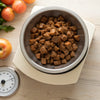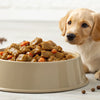Does Wet Dog Food Cause Bad Teeth? Debunking Common Myths About Canine Dental Health
- Houndsy
Table of Contents
- Introduction
- Understanding Canine Dental Health
- The Great Wet vs. Dry Food Debate
- The Importance of Dental Care
- Evaluating Your Dog’s Diet
- Common Misconceptions About Wet Dog Food
- Conclusion
- FAQ Section
Introduction
As pet owners, we routinely think about our dogs’ diets, but how often do we consider the implications of those diets on their dental health? Did you know that periodontal disease is one of the most common health problems in dogs, affecting about 80% of dogs over the age of three? Understanding how the type of food we feed our pets influences their oral hygiene is crucial to their overall well-being. One persistent myth is that wet dog food causes bad teeth.
In this blog post, we will explore the relationship between wet dog food and canine dental health, debunking myths that link moist diets to poor teeth. We will look at the nutritional aspects of wet food, compare it to dry food, and highlight preventative dental care practices that can keep our canine friends’ smiles bright. By the end of this article, you will have a better understanding of how to choose the right diet for your furry companion and promote better dental health. So, as we embark on this journey, take a moment to reflect on your dog's feeding routine. Are you making choices that support their dental health? Let’s find out!
Understanding Canine Dental Health
The Basics of Dog Dental Health
Maintaining good dental health in dogs is essential for their overall health. The mouth harbors many bacteria, and without proper care, plaque can build up, leading to tartar formation and ultimately periodontal disease. This condition can cause pain, tooth loss, and systemic health issues as bacteria from the mouth can enter the bloodstream.
It often begins with gingivitis, which is the inflammation of the gums. If not addressed, this can progress to periodontitis, a more severe form that can destroy the supporting structures of the teeth. Recognizing the signs of dental issues is vital: bad breath, swollen gums, difficulty eating, and loose teeth are all red flags that warrant veterinary attention.
The Role of Diet in Dental Health
Diet plays a significant role in influencing oral health. The texture and composition of what we feed our dogs can either promote or inhibit plaque buildup. Foods higher in carbohydrates can lead to greater plaque accumulation, while those with lower carbohydrate content may help reduce it. This is where the debate between wet and dry dog food comes into play.
The Great Wet vs. Dry Food Debate
Nutritional Comparisons
Wet dog food generally contains a higher moisture content than its dry counterpart and can be more appealing to dogs, especially picky eaters. It is often perceived as more palatable, which can encourage dogs to eat enough to maintain hydration—an essential aspect of their health. Wet food can come in various forms, such as canned food and fresh recipes, often designed to cater to specific dietary needs.
On the other hand, dry food is typically composed of kibble that needs to be chewed. The crunching action of chewing is sometimes believed to help clean teeth, but the reality is more nuanced. Many dogs don’t actually chew their kibble thoroughly, leading to the misconception that kibble provides more dental benefits than it does.
The Myth: Does Wet Dog Food Cause Bad Teeth?
The idea that wet dog food causes bad teeth is rooted in misunderstanding the mechanics of dental health. In fact, studies suggest that the beneficial effects of chewing on teeth are not as significant as many believe. Research has shown that there are no substantial differences in plaque buildup between dogs fed wet versus dry food. What matters more is the overall quality of the diet and the dog's dental hygiene practices.
Investigating Research Findings
Recent studies comparing oral health in dogs fed wet versus dry diets have provided valuable insights. For instance, one study found that dogs consuming wet food showed a higher cumulative plaque score over time; however, their overall oral health was not significantly worse than those consuming dry diets. Similarly, another comprehensive study indicated that while dry food might have some marginal benefits in oral hygiene, it is not a substitute for regular dental care.
The true determinants of dental health come down to genetics, frequent dental care (like brushing), and regular veterinary checkups rather than solely the type of food being consumed.
The Importance of Dental Care
Regular Dental Hygiene
Regardless of the type of food a dog consumes, consistent dental care is vital. Pet owners should prioritize brushing their dogs' teeth as the most effective means of preventing dental disease. The American Veterinary Medical Association recommends brushing your dog's teeth at least two to three times a week.
In addition to brushing, there are various dental chew toys and snacks specifically designed to promote dental health by mechanically reducing plaque and tartar buildup. Chews containing enzymes can also be beneficial, as they help break down plaque.
Veterinary Dental Checkups
Regular veterinary checkups for dental assessments are equally important. Many owners underestimate how often their dogs should see a vet for dental health evaluations—ideally once a year. A professional cleaning may be recommended based on the dog’s oral health condition.
Evaluating Your Dog’s Diet
Transitioning to Wet Food
If you're considering incorporating wet dog food into your pet's diet, it can be done gradually. Start by mixing a small amount with their existing food and increasing it over time based on your dog’s preferences and digestive response. Always monitor for changes in your dog's health or behavior after introducing new food.
Choosing High-Quality Options
When selecting wet or dry food, it's essential to opt for high-quality brands that utilize high-grade ingredients. Look for certifications such as those from the Association of American Feed Control Officials (AAFCO) to ensure the food provides balanced nutrition.
Hydration Matters
Don’t forget that hydration also plays a crucial role in dental health. Many dogs do not drink enough water, especially when fed solely dry food. Feeding wet food can significantly alleviate this issue and promote overall health. With the Houndsy Kibble Dispenser, transitioning to a high-quality wet food diet can be made even easier, providing both convenience and beautiful aesthetics that enhance your home.
Common Misconceptions About Wet Dog Food
Wet Food vs. Bad Breath
One common belief is that wet dog food contributes to bad breath. However, bad breath often indicates dental issues rather than the type of food itself. Feeding a balanced diet, paired with regular dental hygiene practices, can combat unpleasant breath.
Soft Food Equals Bad Teeth
Another prevalent myth is that having a soft diet directly leads to bad teeth. While certain types of mushy food might not support oral health in the same way crunchy kibble (specifically formulated dental diets) might, it is essential to recognize that maintaining a good dental routine is far more critical than the food form alone.
Hydration and Its Benefits
Above all, well-hydrated pets maintain healthier bodies. With wet diets often having around 70-90% moisture content, they can help in keeping your dog's system hydrated, which is beneficial for their oral and overall health.
Conclusion
In summary, does wet dog food cause bad teeth? The evidence suggests otherwise. What truly matters for maintaining your dog’s dental health centers on diet quality, regular dental care, and routine veterinary checkups rather than the wet or dry food debate alone. As dedicated pet owners, we have the power to enhance our beloved companions' quality of life through informed dietary choices and diligent care.
Should you consider transitioning to wet food or bolstering your pet's feeding routine, we invite you to explore the Houndsy Kibble Dispenser. Our innovative dispenser not only offers effortless portion control, but its modern design also elevates mealtimes, making them a delightful experience—for you and your furry friend.
Don’t neglect your pet's dental health! Act now and start prioritizing their oral hygiene.
FAQ Section
1. Is it better for my dog to eat wet or dry food for dental health?
While some believe dry food is better for dental health because of its texture, recent studies show minimal differences in dental health between dogs fed wet and dry food when paired with good dental care. Regular brushing and vet visits will have a more significant impact.
2. How often should I brush my dog's teeth?
It’s recommended to brush your dog's teeth at least two to three times a week. Daily brushing is ideal for preventing plaque accumulation.
3. Can my dog have bad breath from wet food?
Bad breath can indicate dental issues rather than the food itself. If your dog has persistent bad breath, it may be time for a dental checkup.
4. What should I do if my dog has missing teeth?
If your dog has missing teeth, softening their food or feeding them wet food can help them eat comfortably. Always consult your veterinarian to determine the best dietary plan.
5. How can I maintain my dog's dental health?
The best way to maintain your dog’s dental health is to establish a routine that includes regular tooth brushing, dental chews, and professional dental cleanings by your veterinarian.
By debunking myths and arming ourselves with information, we can ensure our furry friends not only have beautiful smiles but also healthy, happy lives.












